Inside Matters
The gut health show – conversations with the most forward-thinking minds in health, fitness, science, nutrition and business. In-depth discussions about how our gut microbiome impacts our health, well-being, mood and more. Inside Matters was conceived by microbiome expert Dr James McIlroy as a platform to raise awareness of the importance of the gut microbiome. Our aim is to inspire and educate listeners around the world about the importance of gut health, equipping them with the knowledge they need to transform their lives for the better.
Episodes
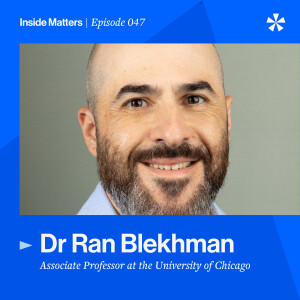
Thursday Jun 26, 2025
Thursday Jun 26, 2025
In this episode, Dr. James McIlroy interviews Dr. Ran Blekhman, an associate professor at the University of Chicago, about the microbiome and its role as 'our second genome.'
Dr. Blekhman shares his research findings on the genetic and environmental factors that shape the microbiome, the heritability of microbial genes, and the relationship between the human genome and microbiome. They also discuss Dr. Blekhman's groundbreaking research that analysed over 168,000 samples to understand global microbiome patterns, the influence of early-life microbiome development, and the potential of microbiome-based diagnostics and therapeutics. Tune in for a comprehensive dive into one of the most promising areas of genetic and microbial research.
00:00 Introduction to Dr. R Blackman and the Microbiome01:23 Podcast Growth and Listener Engagement01:56 Starting the Conversation with Dr. Blackman02:04 Exploring the Second Genome02:24 Human Genome vs. Microbiome03:23 Genetic Interactions with the Microbiome04:02 Understanding Microbial Genes and Functions05:40 Heritability and Environmental Factors06:53 Microbiome Diversity and Heritability08:57 Research on Microbiome Heritability17:18 Baboon Model System for Microbiome Studies18:56 Population Scale Microbiome Research25:27 Global Patterns and Data Integration33:36 The Untapped Potential of Microbiome Data35:08 Hypotheses and Discoveries in Microbiome Research36:46 Geographical Variations in Microbiome49:18 Technical Challenges and Methodologies52:20 AI and Machine Learning in Microbiome Studies54:59 Future Directions and Clinical Applications01:00:38 Exploring Early Life Microbiome01:03:30 Conclusion and Further Reading
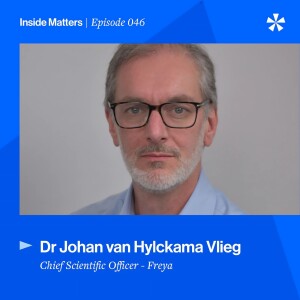
Thursday Jun 12, 2025
Thursday Jun 12, 2025
In this episode of Inside Matters, I'm joined by Dr Johan van Hylckama Vlieg, Chief Scientific Officer at Freya Biosciences. As a global leader in microbiome research, Freya is pioneering innovative approaches to women’s health through biotherapeutics that are rooted in groundbreaking microbiome science.
00:00 Introduction to Dr. Johan van Hylckama Vlieg and Freya Biosciences01:39 The Potential of the Microbiome03:08 Challenges in Translating Microbiome Science to Treatments05:29 The Rise and Fall of Microbiome Hype08:58 Immunotherapy and the Microbiome20:37 Women's Health and the Microbiome35:01 Tools for Measuring Vaginal Dysbiosis35:31 Intervention Studies and Donor Programs36:23 Engraftment and Immune Response37:39 Strain-Level Analysis and Engraftome39:08 Vaginal Microbial Transplantation44:13 Single Strain vs. Consortia47:15 Freya's Development and Future Vision50:04 Lessons from Kaleido01:00:47 The Gates Foundation and Global Health01:03:45 Predictions for the Microbiome Field
A Hidden World with Huge Potential
Dr van Hylckama Vlieg has spent more than 20 years exploring the vast and complex world of the microbiome — the trillions of microbes that live in and on our bodies. These tiny organisms play a huge role in our health. Over time, science has moved from simply identifying these microbes to understanding how they influence our immune system, metabolism and overall wellbeing.
Yet despite this progress, turning those discoveries into real treatments remains a challenge. Dr van Hylckama Vlieg explained that while the science is compelling, the industry needs solid clinical data to bring investors and pharmaceutical companies on board. He sees microbiome-based immunotherapy as a particularly exciting area where transformative breakthroughs could lie ahead.
Why Women’s Health Matters
Freya Biosciences has chosen to focus on the female reproductive tract — a part of the body where the microbiome is less complex than in the gut but just as important. Dr van Hylckama Vlieg spoke about the key role of lactobacilli in maintaining vaginal health. When these helpful bacteria are dominant, they protect against infections and support fertility. When the balance is lost, a state known as dysbiosis, the risks rise significantly.
He also highlighted a wider issue — the historical lack of funding and focus on women’s health. This is something Freya and others in the field are determined to change, and their research is already moving things in the right direction.
A Bold New Treatment: Vaginal Microbiota Transplantation
One of Freya’s most innovative developments is vaginal microbiota transplantation or VMT. Inspired by the success of faecal microbiota transplants for gut health, this approach involves transferring a healthy vaginal microbiome into someone with dysbiosis. Early results are promising. Many women show a successful shift to a healthier microbial state.
Looking ahead, the goal is to leverage the successes of these natural transfers and develop targeted microbial treatments that can be scaled up. This could lead to safe and widely available therapies that restore balance and improve reproductive health.
Challenges and the Road Ahead
Reflecting on his previous experience at Kaleido, another microbiome venture, Dr van Hylckama Vlieg spoke about the need for strong links between science, clinical design and commercial strategy. Though Kaleido faced setbacks, the underlying science remains solid and is being explored by others in the field.
His outlook remains positive. With more trials underway and deeper understanding of how microbiomes influence disease, there is hope that these therapies will move from the lab into everyday medicine. Particularly in areas like immunotherapy, the potential to address root causes rather than just symptoms could be a game-changer.
Final Thoughts
Dr van Hylckama Vlieg’s insights offer a compelling look into a rapidly evolving area of science. As researchers and companies like Freya push forward, the possibilities for transforming healthcare through the microbiome are growing fast. From improving fertility to preventing infections, these tiny organisms may hold the key to better outcomes for millions — especially in areas of health that have long been underserved.
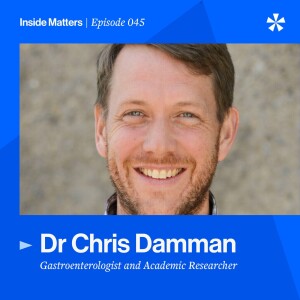
Thursday May 29, 2025
Thursday May 29, 2025
The Gut-Health Revolution | Dr Chris Damman on Nutrition, Microbiome & the Future of Wellness
Dr Chris Damman brings decades of experience from the biotech world and leading global foundations to share his vision for the future of health and nutrition. In this episode, we dive deep into the transformative power of gut health and the emerging science shaping how we eat and live.
Gut Health: Ancient Wisdom Meets Modern ScienceDr Damman explains why gut health is central to well-being, describing it as a “full-circle” return to ancient wisdom where food is medicine. Backed by science, he shows how whole foods can prevent disease and support healthier lifestyles, without being restrictive or unrealistic.
Next-Generation Nutrition: The 4 FsWe explore the idea of “next-generation nutrition” — simple, practical ways to improve your diet with fibre, polyphenols, healthy fats, and fermented foods (the “4 Fs”). These ingredients, found in traditional diets around the world, play a key role in promoting longevity and gut health.
GLP-1 Agonists: A Promising Yet Cautious PathDr Damman discusses the potential of GLP-1 agonists — groundbreaking drugs that help manage appetite, weight, and blood sugar. While powerful, he emphasises the importance of pairing them with real dietary change to avoid over-reliance.
Weed, Seed, and Feed: A Gut Health StrategyUsing the analogy of gardening, Dr Damman breaks down how to support your microbiome: weed out the harmful bacteria, seed the good ones, and feed them with the right foods. This holistic model offers a sustainable approach to digestive health.
Fermented Foods & ProbioticsWe also cover the role of fermented foods as natural sources of probiotics and why they may be more effective than many commercial supplements. These foods are vital for balancing the gut and reducing inflammation.
The Future: Nutrition Tech & Smarter ChoicesDr Damman is now focused on innovation, developing a smartphone app that helps people make smarter food choices by understanding nutritional quality at a glance. His work blends science and technology to make healthy eating both accessible and personalised.
ConclusionDr Damman’s insights are a refreshing mix of practical advice and scientific depth. From diet to digital tools, he shows how we can all take charge of our gut health and live longer, healthier lives. Look out for his upcoming book and app, designed to change the way we think about food.
Chapters:00:00 – Introduction to Dr Chris Damman01:36 – What is Next-Generation Nutrition?05:01 – How the Microbiome Journey Began10:20 – Malnutrition and the Four Fs17:59 – The Truth About Ultra-Processed Foods23:22 – GLP-1 Agonists: Are They a Game Changer?28:45 – The Future of Nutrition and Health35:49 – Smarter Choices with Nutrient Profiling Tech40:38 – How to Balance 'Red' Foods in Your Diet42:11 – Healthier Baking: Tips That Work43:25 – Personalised Diets for Your Microbiome46:12 – Understanding FODMAPs and Gut Symptoms51:51 – Microbiome Therapeutics and Supplements01:01:38 – What’s Next for FMT (Faecal Microbiota Transplantation)?01:05:00 – Gut Health Technology on the Horizon01:10:55 – Final Thoughts and Takeaways

Thursday May 15, 2025
Thursday May 15, 2025
In this episode of Inside Matters, Dr James McIlroy is joined by Professor Yan Yiannakou to discuss the developments in IBS treatment.
Irritable bowel syndrome (IBS) is often brushed off as little more than an inconvenience. But in a recent conversation between Dr James McIlroy and Professor Yan Yiannakou, a consultant gastroenterologist with decades of experience, it’s clear that IBS is far more serious than many realise. Their discussion sheds light on the true impact of IBS and the exciting developments in its treatment.
IBS: A Closer Look
Affecting around 10–15% of the population, IBS can be life-altering for some. Beyond the discomfort, it can seriously disrupt work, relationships, self-confidence, and mental health. Historically, because there was little visible evidence of physical disease, IBS was wrongly considered a psychological condition. Thankfully, this outdated view is changing. New research highlights real physiological changes in the gut, such as immune activation and heightened sensitivity, helping to validate patients’ experiences.
Recognising the Symptoms
Professor Yiannakou explains that IBS typically involves abdominal pain, changes in bowel habits, bloating, and excess wind. Previously labelled a “syndrome” because its causes weren’t well understood, IBS is now recognised as a real disease linked to changes in the gut microbiome and immune system. Symptoms can vary from mild discomfort to severe, debilitating pain that significantly affects daily life.
Breaking Down Misconceptions
A key part of the conversation tackles the myth that IBS is “all in the mind.” While stress can worsen symptoms, it is not the root cause. Dismissing IBS as purely psychological can deepen patients’ distress and delay proper care. Professor Yiannakou stresses the importance of treating IBS as the genuine, physical condition it is.
What Causes IBS?
Although the exact causes are still being explored, IBS often develops after a major gut infection, which can disrupt the gut’s immune system. Treatments are now moving beyond simply managing symptoms like constipation or diarrhoea, with more focus on addressing underlying causes, particularly gut microbiome imbalances.
Hope for the Future
Research into the microbiome’s role in IBS is opening up new treatment options. Early trials of microbiome-based therapies show promising results, but more work is needed to bring these breakthroughs into everyday clinical practice.
Final Thoughts
Professor Yiannakou’s insights highlight the urgent need for better recognition and treatment of IBS. Dispelling outdated myths and focusing on the true physiological causes of the condition offers real hope for those living with IBS. As research continues, the future looks brighter for more effective, lasting treatments.
The conversation touches on everything from genetic influences on obesity and the challenges of sustained weight loss, to the exciting potential of GLP-1 drugs and next-generation probiotics. There’s also a fascinating look at how the microbiome might act as both a diagnostic and therapeutic tool in future medicine.
Finally, Max shares highlights from his book The Power of Hormones, which brings together history, science, and practical advice for anyone curious about how hormones and the microbiome shape our lives.
This episode offers an insightful look at where cutting-edge science meets real-world potential—and why the microbiome could be the key to a healthier future.
Timestamps:
00:00 Introduction to Professor Yan Yau and IBS01:02 Understanding the Impact of IBS02:19 Symptoms and Diagnosis of IBS04:41 Physiological Causes of IBS06:29 Severity and Psychological Impact of IBS09:31 Potential Causes and Triggers of IBS14:22 Current Treatments and Challenges16:30 Future of IBS Treatments and Research40:39 Clinical Trials and Patient Involvement42:32 Conclusion and Final Thoughts

Sunday May 04, 2025
Sunday May 04, 2025
In this episode of Inside Matters, Dr. James McIlroy sits down with Cory Greenberg, a professional cyclist and founder of Ride4IBD.
Cory shares his inspiring journey from his initial diagnosis of inflammatory bowel disease (IBD) while training as a professional cyclist, to overcoming the challenges posed by the disease. The conversation covers his approach to gut health in the context of athletic performance, insights into training and lifestyle adjustments, and his efforts to raise awareness through Ride for IBD. Listeners will gain valuable insights into how Cory manages his condition, optimises his performance, and aims to inspire others facing similar challenges.
Through his story, Cory emphasises the importance of creating a sustainable lifestyle and offers practical advice for those living with IBD or looking to improve their gut health.
00:00 Introduction to Cory Greenberg and Ride for IBD01:09 Cory's Early Passion for Cycling03:39 Development Programs and Training11:15 Diagnosis and Struggles with IBD15:46 Managing IBD and Returning to Cycling20:04 Diet and Nutrition for Gut Health37:00 Practical Tips for Gut Health41:16 Debunking Social Media Health Myths41:44 Personal Struggles with IBD43:16 Understanding Inflammatory Bowel Disease44:54 Cycling as a Platform for IBD Awareness45:39 The Genesis of Ride for IBD47:13 Building a Global IBD Awareness Movement50:10 Innovative Approaches to IBD Management55:20 The Future of IBD Advocacy and Support59:42 Practical Health and Fitness Tips01:13:32 Connecting with Ride for IBD
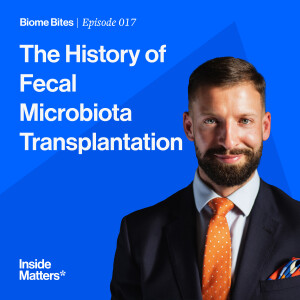
Thursday Apr 10, 2025
Thursday Apr 10, 2025
In this episode of Inside Matters, Dr James McIlroy explores the remarkable evolution of Faecal Microbiota Transplantation (FMT), from its unlikely beginnings to its promising future—and shares exciting new data from his company, EnteroBiotix.
We begin with the pioneering efforts of Mr Ben Eisman in 1958, whose early use of FMT saved lives in cases of severe diarrhoea. From there, Dr McIlroy takes us through decades of progress, culminating in today's pharmaceutical-grade approaches that are changing the face of gut health treatment.
The conversation spotlights the dramatic effectiveness of FMT in tackling recurrent Clostridioides difficile (C. diff) infections and dives into the expanding potential of microbiome therapies for a range of conditions.
James also shares exclusive insights from EnteroBiotix’s recent phase 2 trial, which delivered encouraging results for a next-generation, FMT-based therapy targeting Irritable Bowel Syndrome (IBS). Designed to be scalable, consistent, and patient-friendly, this new approach marks a significant step forward in microbiome medicine.
This episode is a deep dive into one of the most fascinating areas of modern healthcare—and a look at where we're headed next.
Timestamps:
00:00 – The pioneering work of Mr Ben Eisman01:55 – Understanding C. difficile and FMT03:03 – Modern breakthroughs in FMT05:06 – Challenges and innovations07:25 – EnteroBiotix’s next-generation solution11:12 – Clinical trials and promising data14:04 – What the future holds for FMT17:05 – Final thoughts

Thursday Mar 27, 2025
Thursday Mar 27, 2025
In a fascinating conversation with Professor Max Nieuwdorp of the Amsterdam Medical Centre, Dr James McIlroy explores groundbreaking ideas and research surrounding the microbiome, hormones, and their profound impact on metabolic diseases. This insightful dialogue uncovers the remarkable potential of faecal microbiota transplant (FMT) and emerging pharmaceutical strategies in tackling obesity, diabetes, and even cancer.
Timestamps:
00:00 Introduction to Professor Max and the Podcast
02:04 Max's Journey into Microbiome Research
05:06 The Power of Fecal Microbiota Transplantation (FMT)
08:11 Microbiome's Role in Obesity and Metabolic Health
10:42 Challenges and Future Directions in Microbiome Research
14:47 Defining Obesity and Its Genetic Factors
18:39 FMT and Its Impact on Various Diseases
23:48 Optimal Diet for a Healthy Microbiome
31:07 The Power of Combining Probiotics
31:36 The GLP-1 Story: A Deep Dive
32:30 Mechanisms and Effects of GLP-1 Drugs
37:26 The Role of Microbiome in Weight Management
39:18 Selecting the Best Donor for FMT
42:27 Impact of Diet on Microbiome and Health
50:17 Future of Microbiome Research and Therapies
56:13 The Power of Hormones: Book Insights
The Journey into Microbiome Research
Professor Nieuwdorp's interest in the microbiome began serendipitously during his postdoctoral studies at UCSD. There, he encountered revolutionary ideas, particularly through the work of Jeffrey Gordon, which highlighted the significance of the microbiome long before it became widely acknowledged. An unforgettable early success with FMT on a patient with Clostridium difficile infection set the foundation for his enduring commitment to this field. Over the years, Nieuwdorp has been involved in pivotal studies, evolving his understanding of how microbiome therapies could be used in metabolic diseases and beyond.
Understanding FMT and Its Role
FMT has shown remarkable efficacy, especially in treating infections like Clostridium difficile. The discussion highlights an astounding 90% cure rate demonstrated in early trials, a feat Nieuwdorp describes as "seminal". Nonetheless, expanding this success to metabolic conditions such as obesity and autoimmune diseases remains a promising, yet ongoing, challenge.
The Nexus Between Microbiome and Obesity
While the connection between the microbiome and obesity remains a complex issue, Nieuwdorp emphasises how the microbiome's role in weight control is likely more significant over the long term—akin to directing an oil tanker—than as a quick fix. The conversation delves into why the body finds it easier to gain weight than to lose it, considering genetic predispositions and evolutionary pressures. This adaptability of the microbiome, combined with dietary habits, may significantly influence how our bodies metabolise and store energy.
Revolutionary Treatments on the Horizon
Emerging pharmacological treatments such as GLP-1 agonists are causing waves in medicine. These drugs, alongside the potential of next-generation probiotics, promise to reshape how obesity and associated conditions are treated. Intriguingly, research continues to suggest the microbiome might itself produce GLP-1, hinting at a future where therapies target these microbial mechanisms directly.
The Path Forward: Microbiome as a Predictive Tool
Professor Nieuwdorp envisions a future where microbiome profiling becomes a standard diagnostic and preventative tool. It has the potential to predict disease susceptibility, allowing for earlier and more personalised interventions. In parallel, the continued development of FMT and its derivatives may revolutionise treatments for a range of conditions, from cancer to metabolic disorders.
The Educational Perspective: "The Power of Hormones"
In addition to his pioneering research, Nieuwdorp shares insights in his book, The Power of Hormones, presenting a layperson’s guide to understanding hormones across a lifespan. This book interweaves historical narratives with scientific discussion to elucidate how hormones and the microbiome intersect in influencing daily life.
This extensive dialogue with Professor Nieuwdorp is a testament to the potential of microbiome science and the exciting horizon that awaits both researchers and patients. As innovations continue, integrating microbiome knowledge with traditional medical interventions could profoundly change how we understand and treat human health.

Thursday Feb 20, 2025
Thursday Feb 20, 2025
Exploring the Human Microbiome with Dr. Joël Doré: The Future of Gut Health Science
In this episode of Inside Matters, Dr James McIlroy engages in an enlightening conversation with Dr. Joël Doré, Research Director at the French National Research Institute for Agriculture, Food and Environment (NRAE). With over 40 years of experience in microbiome research, Dr. Doré shares his extensive knowledge on probiotics, gut health protocols, at-home microbiome testing, and the gut-brain axis. The discussion delves into the intricacies of the human microbiome symbiosis, the evolutionary development of gut microbiota, and its impact on health conditions such as obesity and chronic diseases. Dr. Doré also sheds light on innovative treatments like faecal microbiota transfer and the significance of microbial diversity for a healthy gut. Tune in to discover how the future of medicine and nutrition hinges on understanding and leveraging the microbial human.
Takeaways
The human body consists of roughly 50 trillion bacteria and 50 trillion human cells.
Gut microbiota aids in digestion and protects against harmful bacteria.
Microbiota educates the immune system, keeping it ready to react.
The microbiome develops from birth, influenced by diet and birth method.
C-section births can delay microbiota diversification and increase the risk of chronic conditions.
Diversity in the microbiome is crucial for health and chronic disease prevention.
At-home microbiome testing lacks standardization and medical utility.
Low microbiome richness is linked to higher chronic disease risks.
Microbiome diversity can predict responses to obesity treatments.
Acrimantium may play a role in health, but microbial ecosystem diversity is crucial.
Fecal microbiota transfer can significantly aid cancer treatment.
Probiotics may not establish long-term but can still be effective during gut transit.
The 100,000 Microbiome Project aims to explore gut health across all ages.
Gut permeability issues can lead to neuroinflammation and mental health challenges.
Future medicine will focus on the microbial aspects of human health.
Chronic conditions are increasingly linked to microbiome health.
Dietary choices profoundly impact gut microbiota diversity.
Research is ongoing to better understand the gut-brain connection.
Preventive nutrition should consider microbial health as a key factor.
Timestamps
00:00 Introduction to Dr. Joël Doré and Microbiome Research00:32 Exploring Probiotics and Gut Health Protocols00:49 At-Home Microbiome Testing: Strengths and Limitations01:38 Understanding the Human Microbiome Symbiosis02:48 The Role of Gut Microbiota in Health and Disease08:18 Microbiome Development from Birth11:08 Impact of Birth Methods and Early Life on Microbiome12:00 Antibiotics and Microbiome Diversity17:48 Challenges in Defining a Healthy Microbiome24:38 At-Home Microbiome Testing: Current State and Future Directions32:51 Microbiome and Obesity: Insights from Research34:21 Microbiome and Immunotherapy: Potential and Challenges39:02 Prognostic Model and Microbiota Transfer40:21 Mad Pharma: Pioneering Fecal Microbiota Transfer41:50 Autologous and Allogenic Microbiota Transfer43:53 Challenges and Innovations in Microbiota Transfer51:25 Probiotics: Do They Work?01:01:50 The Best Diet for the Microbiome01:03:00 The 100,000 Microbiome Project01:08:13 The Gut-Brain Connection01:12:58 Vision for the Future of Microbiome Research01:14:35 Conclusion and Final Thoughts
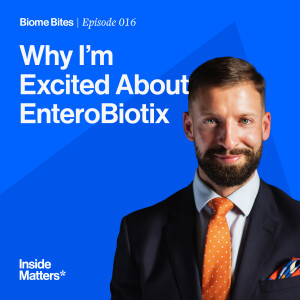
Thursday Jan 09, 2025
Thursday Jan 09, 2025
In this episode, James discusses the progress and future of EnteroBiotix, a company focused on gut health and microbiome therapeutics. He reflects on the transformative year of 2024, highlighting significant milestones in clinical trials, particularly in liver disease and irritable bowel syndrome (IBS). James emphasises the importance of clinical data in drug development and the company's commitment to improving patient care through innovative therapies. He also shares insights on the connection between gut health and overall well-being, and the company's plans for future growth and regulatory engagement.
Takeaways:
EnteroBiotix aims to improve gut health and microbiome therapeutics.
2024 was a transformative year with significant milestones.
Clinical trials are crucial for proving drug efficacy.
The connection between gut health and liver disease is significant.
Irritable Bowel Syndrome (IBS) is often misunderstood as a syndrome.
EnteroBiotix is focused on full-spectrum microbiome therapy.
Data from clinical trials is essential for stakeholder engagement.
The company is committed to patient care and innovative solutions.
Regulatory engagement is key for future drug development.
The team at Interbiotics is dedicated and capable, of achieving remarkable results.
Timestamps:
00:00 Welcome and Introduction
00:19 Overview of EnteroBiotix
01:13 Reflecting on 2024 Achievements
02:00 Clinical Trials and Milestones
04:16 Liver Cirrhosis Trial Insights
08:07 IBS Clinical Trial Success
11:52 Future Prospects and Goals
14:45 Conclusion and Gut Health Tips
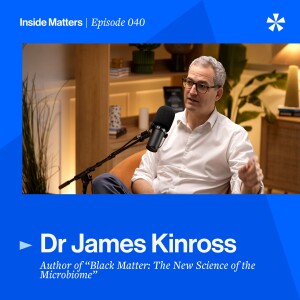
Thursday Nov 28, 2024
Thursday Nov 28, 2024
In a conversation with Dr. James Kinross, a senior lecturer and consultant surgeon at Imperial College London, various aspects of the human microbiome are explored. He is also the author of "Dark Matter: The New Science of the Microbiome".
Dr. Kinross discusses what constitutes a healthy microbiome and the challenges in analyzing it. The conversation also covers new research linking microbiomes to the effectiveness of cancer drugs, the concept of an 'internal climate crisis' within our guts, and the importance of the early life microbiome. Furthermore, Dr. Kinross shares practical advice on diet, probiotics, and the impact of social interactions on gut health.
The dialogue concludes with insights into microbiome testing and its crucial role in both clinical settings and personal health management.
Key Takeaways:
Microbiome Complexity: The microbiome is like a newly discovered organ, vital for health but complex to define and influence. Understanding it is crucial for advancing medical science.
Diet and Diversity: A diverse diet rich in plant fibres supports a flourishing microbiome, which can protect against chronic diseases.
Targeted Therapies: Probiotics and microbial therapies hold promise but require more precise application and understanding to be truly effective.
Prevention Focus: The most significant potential of microbiome science lies in disease prevention, particularly through early-life interventions.
Chapters
00:00 Introduction to Dr. James Kinross and His Work
00:27 Exploring the Microbiome: Definitions and Challenges
00:46 Microbiome and Cancer Research
00:54 Analogies and Concepts in Microbiome Science
01:56 The Dog Microbiome: Insights and Comparisons
07:17 Microbiome Bubble: Hype or Reality?
12:09 The Importance of Microbial Conservationism
20:52 Antibiotics and Microbiome Scarring
28:00 Co-Evolution of Microbes and Humans
37:33 Practical Advice for Improving Your Microbiome
41:07 Understanding Biodiversity and Microbiome Health
41:48 Defining a Healthy Microbiome
42:28 Challenges in Microbiome Diagnostics
46:03 The Role of Diet and Antibiotics
51:51 The Controversy of Probiotics
58:08 Microbiome Testing in Clinical Practice
01:06:31 Microbiome's Impact on Drug Efficacy
01:11:14 Future of Microbiome Therapeutics
01:15:04 Practical Advice and Final Thoughts






